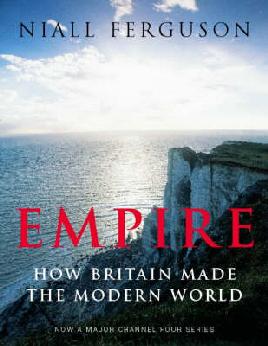 The British Empire evokes all manner of contentions and sentiments.
The British Empire evokes all manner of contentions and sentiments.
Some have profoundly resentful feelings toward it, others take a more positive and apologetic position regarding its history and legacy.
It was the largest empire in history. Its size and magnitude equalled by no other - with territories, dominions, colonies, businesses, religious organisations, armies and navies spanning almost a quarter of the earth. With mixed results. Depending on what side of history you are on.
Therefore, any book which attempts to provide a detailed, fair and comprehensive exposition of the British behemoth could conceivably stretch out into several volumes, or one book featuring squillions of pages, all rigorously peer reviewed and counter argued.
In Empire: How Britain made the modern world Ferguson doesn't do that. Who would?
But, he manages to cleverly consolidate almost 400 years of British Empire history into six relatively well rounded chapters.
He begins with his own brief and intimate family history, detailing how his impoverished Scottish ancestors fared under the Empire as settlers grinding out a better life in the North American plains. Something to be proud of, as the family sips port and gives historical accounts around the fire.
Beyond this we get mostly objective historical stuff, beginning in England, where the British population's appetite for tea, sugar, fine linens and tobacco drove industrious and ambitious types to India and the Caribbean, in order to cash in on what was an insatiable consumerism for new treats on the streets of London. Quite a funny treatment actually.
This consumerism then lead to an entrepreneurialism fused with coercion - as England set up export platforms "protected" by armies and English merchant vessels chaperoned by navies, complete with the use of slaves until interestingly, Christian lobby groups lead by William Wilberforce finally lobbied parliament to end the slave trade - arguably making England the first to end the evil practice.
While many aspects of British doings and wrongdoings are left untouched, much of the Empire's history is given a good going over featuring the Americas, Africa, India, Australia with lots of others in between (New Zealand is touched on a bit). All with quite a bit of depth.
The book is laced with intimate and honest accounts from various individuals who found themselves receiving the charity or inhumane treatment of the Empire (Slaves, Kipling, Livingston). This comes as Ferguson traces the lives and travels of various subjects and victims who found themselves in unfamiliar parts of the globe through slavery, indentured slavery, crime, commerce and political work.
The British Gentleman's fascination with the exotic Indian women is revealed candidly in the musings of diaries. Quite hilarious - English men caught in the paradox of exclusivity, class and lust.....
These reports really bring the academic/historical work to life.
It's certainly an apologetic piece, but rather than address the familiar question of whether or not the Empire was "good or bad", rather, he attempts to vindicate England in a sense by mooting what otherwise would have been in England's absence - one is left to make extrapolations in imagining various parts of the globe under the Japanese or Russians (among others) instead. He puts forward an interesting case.
I don't think there will ever be an account of the British Empire which won't be contested by commentators and academics. There's just too much scope for that.
Ferguson tries to be unbiased though, highlighting the virtues and sins of England over the lengthy 400 year period.
As an economic historian, his particular angle is quite unique and insightful.
Recommended reading for anyone interested in history, economics and trade. The political, economic and philosophical legacy imparted to many peoples by the British is easily overlooked, as were immersed in it. For better or worse. You decide.



Add a comment to: Empire: How Britain Made The Modern World by Niall Ferguson